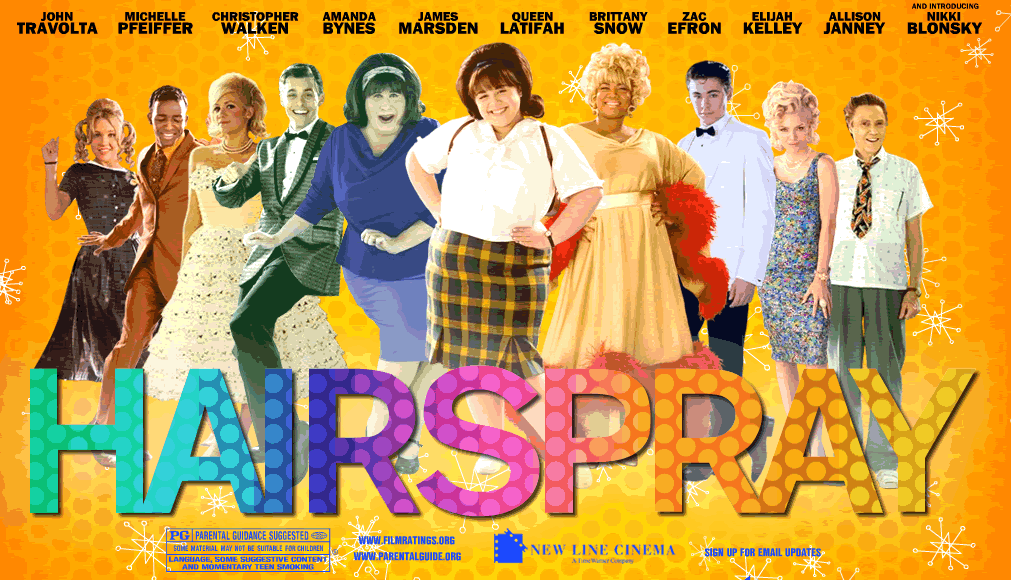The 2007 remake of the 1988 film Hairspray shares many things in common with the original such as characters and basic plot and ideology. Everything that happens in the film is much the same, and even the idea behind the film maintains its motifs of gender and race. The way in which it explains these issues, however, is somewhat different. This film is also just as campy as its predecessor, but not exactly in the same way. The new Hairspray analyzes its central issues of gender and racism by utilizing the exaggerated and unnatural style that is camp.
There are certainly many aspects of this film which concern gender, except, unlike in the earlier version, this film contains a more highly sexualized view of femininity. Of course, appearances are everything as evidenced by the ratted, hairspray-stiffened hair of many of the characters. Even the idea of hairspray, though, becomes a part of an innuendo when there is an advertisement on the Corny Collins Show and Corny says, “hey baby, you look like you could use a stiff one,” adding a level of sexuality that was not present before concerning hairspray—the product or the film. The character of Velma Von Tussle, while certainly important in the first film, takes on an even more powerful and ominous role. Michelle Pfeiffer’s character is meant to be both conniving and alluring even more so than before. She expects her daughter to be the best dancer and win the Miss Hairspray title in order that she might vicariously relive her own glory days. Early on in the film, she reveals her true character, singing “I screwed the judges,” proving that she will go to any length in order to get what she wants. This later proves true when she attempts to seduce Mr. Turnblad, causing he and his wife to get in a fight and almost succeeding in removing Tracy from the Corny Collins Show. Despite her own promiscuous nature, Velma is unwilling to allow any such behavior on the show. One of the council members takes a leave of absence for “just nine months” and Velma states that she will not allow hip thrusting or anything of the like. It seemed interesting, then, that there are some on the show who dress in a way that appears to be much more immodest than anything she would ever allow for.
There was a great contrast between the two versions of the song “New Girl in Town”. The initial version played on a regular episode of the show, and the white girls singing it wore modest dresses with high necklines and skirts that went below the knees, while when it was sung on Negro Day, the black girls wore tight, low cut, cleavage-revealing, slit-up-the-thigh dresses which portrayed them in a much more sexual light. In this way, the audience sees them in a negative light compared to the nice, clean-cut white girls who reveal very little skin. This very same idea is shown to the audience when Corny sings that the show has “nice white kids who like to lead the way, and once a month we have our Negro Day”. Velma proves important in demonstrating the issue of racism in the film as well. She is extremely upset that the same number was performed on Negro Day as before when the “white kids” sang it. Motormouth Maybelle attempts to defend this decision; the teenagers performing for Negro Day were, after all, the ones to write the song. This makes no difference to Velma, however, who insists on defending “the white way”.
The portrayal of racism in the film aligns closely with its campiness. Tracy exuberantly proclaims “I wish every day were Negro Day!” and later tells her mother, “it’s changing out there—people who are different—their time is coming!” While these are both certainly encouraging and inspirational statements, they are excessively energetic and unrealistic, albeit sincere. Penny, too, makes such a statement, telling Seaweed, “I was afraid the colors of our skin would keep us apart”. Even the fact that Little Inez is voted to be Miss Hairspray at the end of the film is again extremely positive, but also extremely unlikely and almost an overstatement of the film’s purpose. This aspect was very similar to the original film, as well as the overall idea of camp.
The film’s focus was the Corny Collins Show which automatically alerts viewers that they are about to see camp. “He’s Corny!” tells us much more than the name of the show’s host, but also characterizes its content. In many ways, the campy aspects of the film overshadowed the serious themes such as gender and racism. As Bayer states in his review, “The film worked at its best when it delved into the subversive humor of the racial idiocy of the 60’s…Unfortunately, there was so much of that, I found it difficult to take the serious parts…well, serious.” This is well put, especially considering lines such as Travolta’s “knights in armor don’t come any shinier than you” when addressing Walken. Bayer agrees that parts such as this are funny, but states that the film is “still just an over-the-top comedy which tries to pull off a little too much”. While the film does address the same issues as the original, it takes camp to a whole new level and detracts from its themes, certainly making it entertaining, but weakening its overall message.
